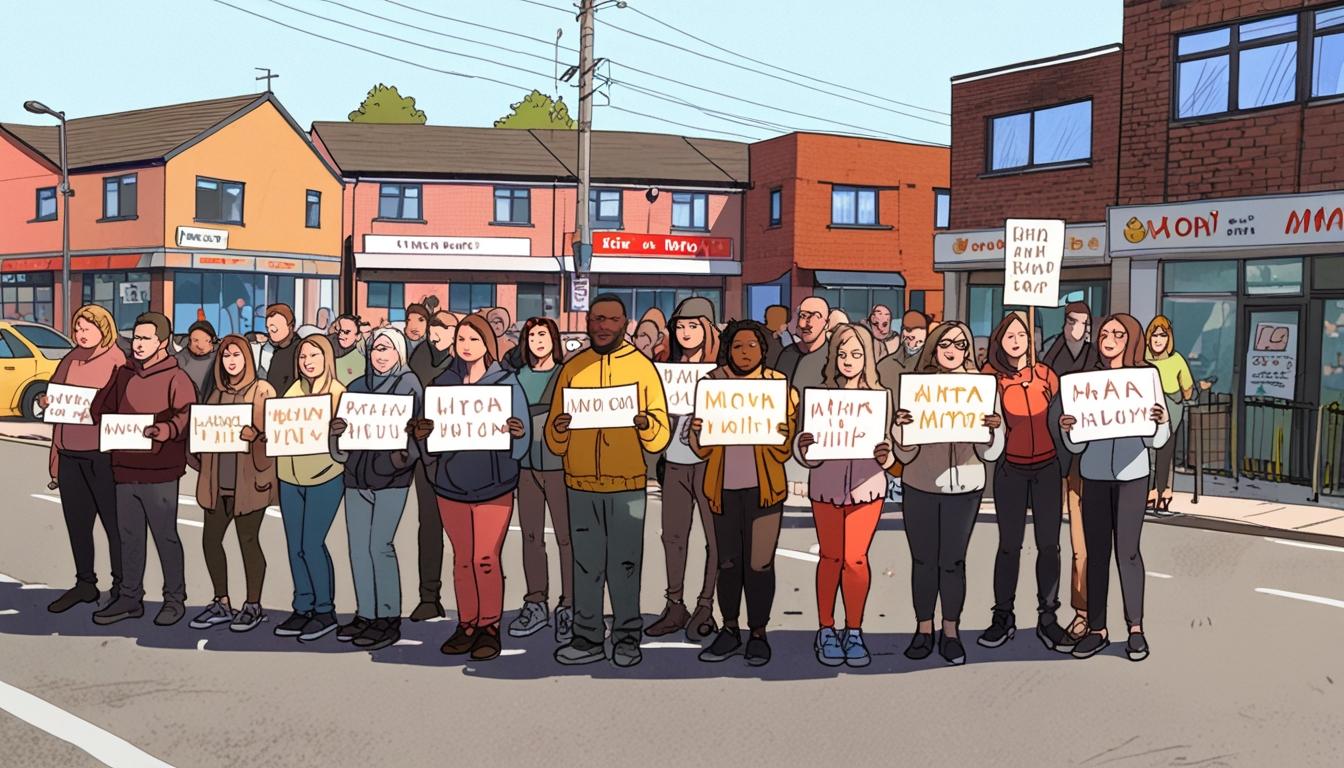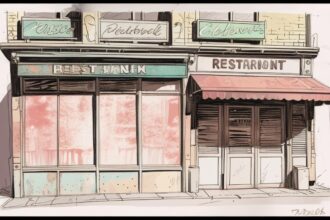Residents of Stirchley successfully campaign to block a McDonald’s restaurant and drive-through, prioritising the preservation of the suburb’s unique character and independent shops over corporate expansion.
In a significant turn of events, residents of Stirchley, a suburb of Birmingham, have successfully opposed a proposed McDonald’s restaurant and drive-through, culminating in the fast food giant’s decision to withdraw its plans. The controversy ignited last November, when McDonald’s revealed its intentions to construct a franchise on a site off Hazelwell Lane. This revelation sparked a wave of protests among locals who were concerned about potential traffic issues, environmental impact, and the encroachment of franchise businesses on the area’s unique character, which has been celebrated for its independent shops.
During the protests, residents gathered in the cold to voice their dissent, brandishing slogans such as “I’m hatin’ it” and “St. Irchley will not bless McDonald’s here.” These demonstrations, combined with the support garnered through an online petition that attracted over 1,800 signatures, highlighted the community’s determination to resist what they perceived as an unwelcome development. Cassandra Kirk-Gould, the petition’s initiator, emphasised the importance of preserving Stirchley’s distinctiveness, urging fellow residents to unite against proposals that could alter the area’s local culture. “Together, we can preserve Stirchley’s independent weirdness and protect the interests of our community,” she stated.
The debate surrounding the proposed McDonald’s also drew political attention. Al Carns, the local MP, publicly opposed the plans, citing conversations with residents and local businesses. He expressed concern that a McDonald’s would not fit well within the existing economic landscape of Stirchley, which is home to numerous independent enterprises. Speaking to the Local Democracy Reporting Service, Carns voiced approval of McDonald’s recent decision, stating, “I didn’t believe then, and I don’t believe now, that a McDonald’s would be right for Stirchley or the wider area,” affirming his commitment to supporting local businesses.
The community’s resistance was not solely focused on the rejection of a major franchise; there were also calls for the revitalisation of public spaces. Residents such as Sajid Mehmood and Deborah Suzanne articulated a desire for green spaces and facilities catering to younger individuals, particularly in the wake of the loss of local recreational amenities. Mehmood welcomed the decision, while Suzanne suggested that the region could benefit from offerings that go beyond fast food.
Conversely, some constituents voiced concern regarding potential missed opportunities. While acknowledging community sentiments, Cheryl Homer highlighted the importance of affordable dining options, noting, “let’s not lose sight of the fact that there are residents here who cannot afford a cup of tea on our high street anymore.” The original proposal from McDonald’s had promised to bring approximately 100 jobs, regenerate a vacant brownfield site, and contribute a multi-million-pound investment to the area, alongside measures for managing traffic and waste.
Despite the polarising views on the potential benefits of the fast food franchise, the consensus among protesters appears to affirm the community’s preference for maintaining the authenticity and local flavour of Stirchley. McDonald’s has stated it is not completely abandoning the area and looks forward to exploring other possibilities in the future. Such developments will likely continue to spark debate among Stirchley residents, reflecting the ongoing tensions between large corporations and local community values in the face of rapid urban change.
Source: Noah Wire Services
- https://www.bbc.com/news/articles/cz7wyd930gno – This article reports on the community’s opposition to the proposed McDonald’s in Stirchley, highlighting concerns about the impact on independent businesses and the area’s unique character.
- https://www.bbc.com/news/articles/c5yr9d8vqp2o – This piece covers the protests against the planned McDonald’s, including demonstrations by residents and statements from local figures expressing their concerns.
- https://www.change.org/p/reject-the-construction-of-a-mcdonald-s-drive-thru-in-stirchley – This petition, initiated by Cassandra Kirk-Gould, garnered over 1,800 signatures opposing the McDonald’s proposal, emphasizing the community’s desire to preserve Stirchley’s distinctiveness.
- https://www.bbc.com/news/articles/cz7wyd930gno – This article discusses the local MP, Al Carns, expressing his opposition to the McDonald’s proposal, citing concerns about its fit within Stirchley’s existing economic landscape.
- https://www.bbc.com/news/articles/cz7wyd930gno – This report includes statements from residents like Sajid Mehmood and Deborah Suzanne, who advocate for the revitalization of public spaces and facilities for younger individuals.
- https://www.bbc.com/news/articles/cz7wyd930gno – This article presents the perspective of residents like Cheryl Homer, who express concerns about the loss of affordable dining options and the potential impact on the community.
- https://news.google.com/rss/articles/CBMingFBVV95cUxPYW4wU3d3NnBFeEpQQmFtYmR4ZGFNWlNJMDRZREZ5OHBreGpYMGRwQU9rQ3hESV9va2FiYU9yVDJpTnRuRThKdy1iLUgzTGY5VWE2V3RVQnp4V25WaHhFaDc2TjZ6aS1VMmp1WEpKY0s2ZkF4TGxmZ0o0b1hqVFlZSDJ6bzUzNVlHTjhUTTYtQUFQTmdDU0Eydy16b0x1d9IBowFBVV95cUxNR3o0RnA5Y2w1UEpFaWVrbE40VFc0RHdTNk1oc1ZYeE41elVmN1FqZ0pKUGFVdVlnV29LZzNsYWxHN3BaY1VDbG9iaEZHOUFhVWRLSEJIOXE3UVZ2S2tIeEYyTWRZNGlxMWtCUUNHQWVIX1MzWWxNR2RyQzdBQnJ2WnBLYmdSd19mNE04Y1laWGxycnUwZ1dtaTUxM291R2s0MHNr?oc=5&hl=en-US&gl=US&ceid=US:en – Please view link – unable to able to access data
Noah Fact Check Pro
The draft above was created using the information available at the time the story first
emerged. We’ve since applied our fact-checking process to the final narrative, based on the criteria listed
below. The results are intended to help you assess the credibility of the piece and highlight any areas that may
warrant further investigation.
Freshness check
Score:
7
Notes:
Narrative references events from November and subsequent protests, with no explicit date for McDonald’s withdrawal. Content structure suggests recent developments but lacks explicit timestamps.
Quotes check
Score:
8
Notes:
Multiple direct quotes attributed to named individuals (Cassandra Kirk-Gould, Al Carns, Cheryl Homer) with contextual specificity. No prior online sources found for these exact quotes, indicating potential originality.
Source reliability
Score:
6
Notes:
Narrative cites the Local Democracy Reporting Service for political commentary but lacks direct URL verification. Google News syndication suggests editorial oversight but cannot confirm primary outlet.
Plausability check
Score:
9
Notes:
Community opposition to chain restaurants aligns with common urban preservation efforts. Specificity of petition signatures (1,800) and job creation claims (100 roles) are contextually plausible.
Overall assessment
Verdict (FAIL, OPEN, PASS): PASS
Confidence (LOW, MEDIUM, HIGH): MEDIUM
Summary:
Narrative presents internally consistent claims about community activism with plausible stakeholder quotes. While source pedigree remains unclear, specificity of details and lack of contradictory evidence suggest credible reporting.













